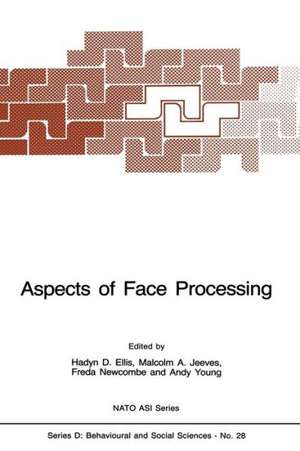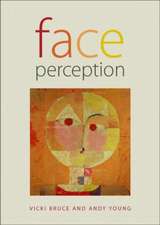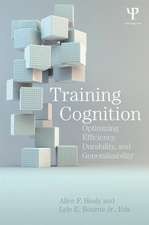Aspects of Face Processing: NATO Science Series D:, cartea 28
Editat de H. D. Ellis, Malcolm A. Jeeves, Freda Newcombe, Andy Youngen Limba Engleză Paperback – 3 oct 2013
Din seria NATO Science Series D:
- 18%
 Preț: 1223.25 lei
Preț: 1223.25 lei -
 Preț: 399.88 lei
Preț: 399.88 lei -
 Preț: 398.74 lei
Preț: 398.74 lei - 18%
 Preț: 953.35 lei
Preț: 953.35 lei -
 Preț: 389.88 lei
Preț: 389.88 lei - 18%
 Preț: 1230.53 lei
Preț: 1230.53 lei -
 Preț: 399.29 lei
Preț: 399.29 lei - 18%
 Preț: 953.35 lei
Preț: 953.35 lei - 18%
 Preț: 1226.90 lei
Preț: 1226.90 lei - 5%
 Preț: 390.13 lei
Preț: 390.13 lei - 5%
 Preț: 370.94 lei
Preț: 370.94 lei -
 Preț: 412.95 lei
Preț: 412.95 lei - 18%
 Preț: 1224.18 lei
Preț: 1224.18 lei - 15%
 Preț: 480.20 lei
Preț: 480.20 lei -
 Preț: 412.95 lei
Preț: 412.95 lei - 18%
 Preț: 1226.73 lei
Preț: 1226.73 lei - 5%
 Preț: 2124.15 lei
Preț: 2124.15 lei - 15%
 Preț: 638.11 lei
Preț: 638.11 lei - 18%
 Preț: 1833.16 lei
Preț: 1833.16 lei -
 Preț: 390.84 lei
Preț: 390.84 lei - 18%
 Preț: 1237.80 lei
Preț: 1237.80 lei - 18%
 Preț: 1826.69 lei
Preț: 1826.69 lei - 18%
 Preț: 1830.34 lei
Preț: 1830.34 lei -
 Preț: 388.13 lei
Preț: 388.13 lei - 18%
 Preț: 948.47 lei
Preț: 948.47 lei - 18%
 Preț: 1835.53 lei
Preț: 1835.53 lei - 18%
 Preț: 1227.67 lei
Preț: 1227.67 lei - 18%
 Preț: 1225.79 lei
Preț: 1225.79 lei -
 Preț: 398.53 lei
Preț: 398.53 lei - 18%
 Preț: 1831.73 lei
Preț: 1831.73 lei -
 Preț: 396.24 lei
Preț: 396.24 lei - 18%
 Preț: 1661.13 lei
Preț: 1661.13 lei
Preț: 401.24 lei
Nou
Puncte Express: 602
Preț estimativ în valută:
76.78€ • 80.38$ • 63.53£
76.78€ • 80.38$ • 63.53£
Carte tipărită la comandă
Livrare economică 07-21 aprilie
Preluare comenzi: 021 569.72.76
Specificații
ISBN-13: 9789401084673
ISBN-10: 940108467X
Pagini: 524
Ilustrații: XI, 509 p. 39 illus.
Dimensiuni: 155 x 235 x 28 mm
Greutate: 0.73 kg
Ediția:Softcover reprint of the original 1st ed. 1986
Editura: SPRINGER NETHERLANDS
Colecția Springer
Seria NATO Science Series D:
Locul publicării:Dordrecht, Netherlands
ISBN-10: 940108467X
Pagini: 524
Ilustrații: XI, 509 p. 39 illus.
Dimensiuni: 155 x 235 x 28 mm
Greutate: 0.73 kg
Ediția:Softcover reprint of the original 1st ed. 1986
Editura: SPRINGER NETHERLANDS
Colecția Springer
Seria NATO Science Series D:
Locul publicării:Dordrecht, Netherlands
Public țintă
ResearchCuprins
1. Introduction.- to aspects of face processing: Ten questions in need of answers.- 2. Perceptual Processes.- Microgenesis of face perception..- Recognition memory transfer between spatial- frequency analyzed faces..- Reaction time measures of feature saliency in a perceptual integration task..- Perception of upside-down faces: An analysis from the viewpoint of cue-saliency..- 3. Memory Processes.- On the memorability of the human face..- Face recognition is not unique. Evidence from individual differences..- Lateral reversal and facial recognition memory: Are right-lookers special?.- Context effects in recognition memory of faces: Some theoretical problems..- 4. Cognitive Processes.- Recognising familiar faces..- Face recognition: More than a feeling of familiarity?.- Getting semantic information from familiar faces..- What happens when a face rings a bell?: The automatic processing of famous faces..- 5. Socio-Cognitive Factors.- Levels of representation and memory for faces..- Formation of facial prototypes..- Stereotyping and face memory..- The influence of race on face recognition..- Faces, prototypes, and additive tree representations..- 6. Cortical Specialisation.- Functional organization of visual neurones processing face identity..- Hemispheric asymmetry in face processing in infancy..- Models of laterality effects in face perception..- Hemispheric asymmetries in face recognition and naming: effects of prior stimulus exposure..- Patterns of cerebral dominance in wholistic and featural stages of facial processing..- Hemispheric differences in the evoked potential to face stimuli..- Cerebral and behavioural asymmetries in the processing of “unusual” faces: A review..- 7. Prosopagnosias.- Current issues on prosopagnosia..- The cognitive psychophysiology ofprosopagnosia..- Prosopagnosia: Anatomic and physiologic aspects..- Faces and non-faces in prosopagnosic patients..- Observations on a case of prosopagnosia..- 8. Brain Pathology.- Facial processing in the dementias..- The matching of famous and unknown faces, given either the internal or the external features: A study on patients with unilateral brain lesions..- Face recognition dysfunction and delusional mis identification syndromes (D.M.S.)..- 9. Facial Expressions.- Facial expression processing..- The perception of action versus feeling in facial expression..- Towards the quantification of facial expressions with the use of a mathematic model of the face..- Is the faster processing of expressions of happiness modality-specific?.- Primary stages in single-glance face recognition: Expression and identity..- Affective and cognitive decisions on faces in normals..- 10. Applications and Computer Technology.- Dynamics of facial recall..- The recall and reconstruction of faces: Implications for theory and practice..- An interactive computer system for retrieving faces..- Investigating face recognition with an image processing computer..- Practical face recognition and verification with WISARD..- 11. An Overview.- Plenary session. An overview. Complementary approaches to common problems in face recognition..- 12. References.- Addresses of Principal Authors.












